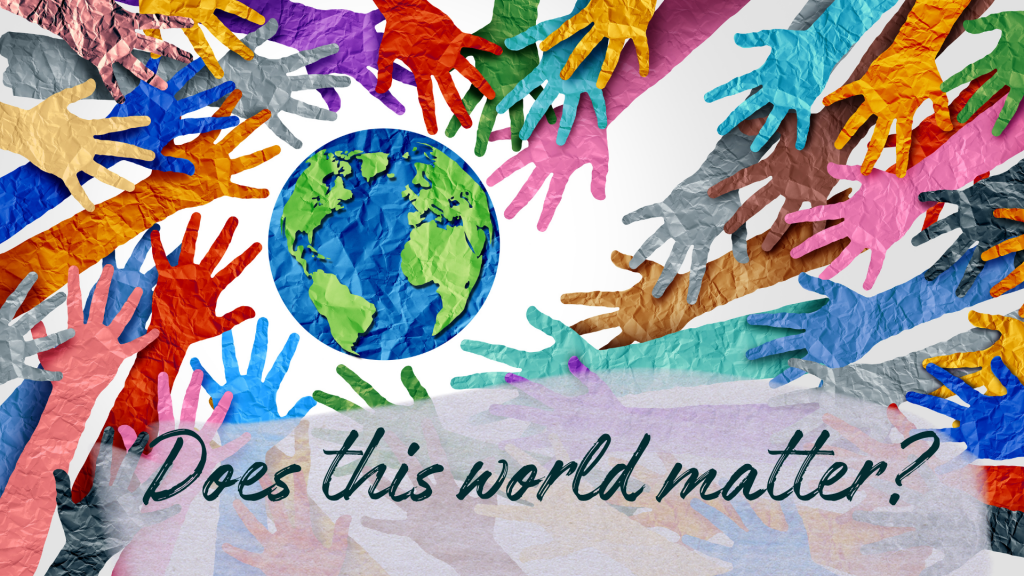Does this world matter to God?

As I’m sipping my coffee, I’m looking up all the ways that the word “world” (kosmos) is used in the Gospel of John. (No one is surprised that my devotion time would be so nerdy.)
John is the gospel that perhaps most revels in duality: light vs. darkness; good vs. evil; truth vs. lies.
We do see some of that with John’s use of “world.” The world is that which is other than God and the divine and heavenly: “If you belonged to the world, the world would love you as its own. Because you do not belong to the world, but I have chosen you out of the world – therefore the world hates you” (John 15:19). Jesus repeatedly refers to his enemy, “the prince of this world” (12:31, 14:30, 16:11). Jesus even comforts his disciples by saying to them, right before his arrest and execution: “be of good cheer; I have overcome the world” (John 16:33).
Yet in the midst of the dualism is another pattern: the world as the place and the people towards which God moves with the gift of salvation. “Behold, the Lamb of God, who takes away the sin of the world!” is John the Baptist’s proclamation about Jesus. Jesus’ body is given “for the life of the world” (John 6:51). This pattern is made explicit in these most famous of verses:
For God so loved the world that he gave his only Son, so that everyone who believes in him may not perish but may have eternal life. Indeed, God did not send the Son into the world to condemn the world, but in order that the world might be saved through him. (John 3:16-17)
These two patterns collide on the cross, where the world publicly rejects and kills Jesus – and in that very action, God saves the world.
The Gospel of John treats “the world” like the Prodigal Son: it’s on the wrong path, it has even betrayed God – and yet God loves the world. God has never stopped loving the world. God will always remember it as the work of God’s own hands – the life that God birthed through the act of Creation (John 1:10).
If that is what we see through the life of the Son – perhaps we should not be surprised that we see the Spirit picking up that same work in the book of Acts.
At the very beginning of Christianity, all Christians were Jews that followed Jesus. They did not exchange their Jewish identity for a new one, but now they defined that identity through Jesus. And in keeping that identity, they kept up certain ways of relating to non-Jews, aka Gentiles. The Greek word for Gentiles is ethnos, which simply means “the nations” – or, we might say, “everybody else, who are not my people.” Many Jews, as an act of faithfulness to God, kept as separate from Gentiles as they could. No eating together. No socializing.
This is why we see Peter enter the house of a powerful Roman Gentile and open with lines that hit my ears as inconsiderate: “You yourselves know that it is unlawful for a Jew to associate or even visit with a Gentile…” (Acts 10:28).
Yet God had just given Peter a vision, in which God told Peter that he “should not call anyone profane or unclean.” And God was about to give Peter another vision through these Gentiles – these others, outside of the circle of God’s chosenness.
Peter learns that this Gentile, Cornelius, had also received a vision from God. And while Peter was preaching, “the Holy Spirit fell upon all who heard the word…for they heard them speaking in tongues and extolling God.” Peter and his fellow Jews were shocked to see the Spirit falling so powerfully on people from outside the nation of Israel. Peter sees what God is doing here and follows God’s lead: “Can anyone withhold the water for baptizing these people who have received the Holy Spirit just as we have?” (Acts 10:44-48).
Peter will be called to account for these baptisms before a group of other Jewish-Christian leaders. In the midst of that debate, he makes his case even more emphatically: “If then God gave them [the Gentiles he baptized] the same gift that he gave us when we believed in the Lord Jesus Christ, who was I that I could hinder God?” (Acts 11:17).
Theologian Willie James Jennings pulls this lesson from Acts 10-11:
“…we see that our world is actually God’s world. God is moving, living, fully and freely acting in the world, beloved and cherished. This world matters to God. We matter to God far more than we matter to each other.”1
Willie James Jennings
This challenge meets us each Easter season as many churches gather to read the Book of Acts and remember what God called the Church to do after Jesus’ resurrection and ascension. This challenge meets Christians every day: can we see all people – even those who are “of this world” – like God sees them: intentionally created and loved? Can we keep our eyes open to the ways God may already be reaching out to them, to signs of the Spirit already descending with power into their lives?
May we, the Church, follow where the Holy Trinity has already gone – not only for the sake of others, but for our own as well. God’s mission for us is always wider than we imagine.
Pr. Kate
April 19, 2023
Pastor Jim and Pastor Kate take turns writing weekly devotions for the Chapel of the Resurrection.
1 Willie James Jennings, Acts, (Louisville: Westminster John Knox Press, 2017), pp. 102-103.